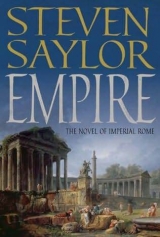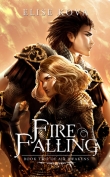
Текст книги "Empire"
Автор книги: Steven Saylor
Жанр:
Исторические приключения
сообщить о нарушении
Текущая страница: 39 (всего у книги 45 страниц)
AD 118
Trajan was dead.
Four years of campaigning in the East had yielded a series of conquests, including the capture of Ctesiphon and the subjugation of much of the Parthian empire. Armenia was made a Roman province, expanding Roma’s empire to the shores of the Hyrcanian Sea, as were Mesopotamia and Assyria, which included the fabled city of Babylon and the Tigris and Euphrates rivers, giving Roma direct access to the Persian Gulf and control of all imports from India and Serica, including silk. Trajan sent a letter to the Senate in which he declared that his mission was accomplished; he regretted only that he was too old to follow the example of Alexander and march all the way to India. In fact, throughout the campaigns, he often displayed the vigour of a man half his age, marching on foot and fording swift rivers alongside his soldiers, who worshipped him like a god.
Then, even as scattered rebellions broke out in the newly conquered territories, Trajan fell ill. His condition became so grave that Plotina, who was with him, persuaded him to set sail for Roma. He did not get far. Off the coast of Cilicia, he suffered a paralyzing stroke, then was afflicted with a dropsy that caused parts of his body to swell to enormous size. Further travel was impossible, and the imperial fleet made harbour at the small port city of Selinus. Trajan died there at the age of sixty-four, ending a twenty-year reign that had added unprecedented wealth and territory to the empire.
Hadrian, serving as governor of Syria, was declared emperor.
He had arrived in Roma some days ago, but as yet he had been seen by only a handful of people. This was to be the day of his public debut as emperor, with a triumphal procession to celebrate the stupendous conquests in the East. The triumph would not be for Hadrian but in posthumous honour of the Divine Trajan.
In preparation for the triumph, Marcus and Apollodorus had been very busy. The entire route of the procession had to be decorated with pennants and wreaths, as did various temples and altars all over the city. Viewing stands had to be erected near the Column, where the procession would reach its climax. Stage sets had to be designed for the plays that would be produced in the days ahead. Decorations had to be made for a great many banquets, large and small. Apollodorus had been summoned for a private audience the first day Hadrian arrived and had been in daily contact with him ever since. Marcus, working under Apollodorus, had not yet seen the new emperor.
The hour was early. The city had not yet begun to stir, but Apollodorus and Marcus and their workers had already been up for hours, labouring by torchlight to ready the triumphal route. The procession was only a few hours away.
They stood near the Column, surveying the brightly coloured streamers that had been affixed to the viewing stands. In the utterly still air the streamers hung as limp as shrouds, but with the slightest breeze they would snap to life, their undulations adding excitement and colour to the acclamations of the crowd.
Marcus threw back his head, opened his mouth wide, and yawned.
“Did you get any sleep at all last night?” said Apollodorus.
“Last night? It’s not dawn yet. This is still yesterday.”
Apollodorus laughed. “You’re babbling, Pygmalion. Did you go to bed early, as I told you to?”
“Yes, but…” Marcus was about to say, My wife went to bed with me, which meant I got no sleep at all, but since his wife was Apollodorus’s daughter, he restrained himself. Apollodorus nevertheless read his thought – the two had worked together for so long that each usually knew what the other was thinking – and smiled indulgently. The relationship between Apollodora and Marcus had grown gradually, with a long courtship that had given both of their fathers a chance to get used to the idea. Apollodorus was aware of Marcus’s irregular origins, but marriage into such an ancient patrician family was a great honour for the daughter of a Damascene Greek; for Lucius Pinarius, the match had seemed far below his son’s station, but Marcus clearly loved the girl, and when Lucius asked himself, “What would Apollonius of Tyana do?” – always his test for making a difficult decision – he enthusiastically approved the union.
The marriage was a happy one. So far, there had been no children – but not for lack of trying, as Marcus made clear with another yawn and a dreamy smile.
“I never thought I’d see this day,” declared Apollodorus, gazing at the cleaners who were sweeping the empty square soon to be thronged with people.
“The day we’d celebrate a triumph over the Parthians?” said Marcus.
“No, the day Hadrian would ride through the streets of Roma as Caesar. He still seems a boy to me. I suppose I thought Trajan would live forever.”
“So did Trajan, apparently,” said Marcus. “Even towards the end, when he was paralyzed and puffed up like an Arabian adder, they say he refused to make a will. Some say he wanted to die without naming a successor, in imitation of Alexander the Great. How did Hadrian become emperor?”
“It was all Plotina’s doing,” said Apollodorus. “Not that Hadrian wasn’t the obvious choice. But it was Plotina who assured his legitimacy. She told everyone that her husband had adopted Hadrian with his very last breath, and she rallied her loyal courtiers to support Hadrian at every turn. Some say Plotina must be in love with Hadrian, and the two were carrying on an affair behind Trajan’s back.”
“Is that likely?”
Apollodorus laughed. “Knowing Hadrian, what do you think? I suspect Plotina’s affection for him is more of the maternal variety, don’t you? Oh, I’m sure she’s infatuated with him, and has been for a very long time, in the way an older woman may be smitten by a younger man. But that doesn’t mean their relationship is carnal.”
“I suppose Hadrian will be heading off to war as soon as this triumph is over,” said Marcus.
“Why do you say that?”
“I’ve heard that a great many of the newly conquered cities are in revolt. Insurgencies threaten to undo all those lightning-quick conquests made by Trajan. Hadrian will have to go back and reconquer everything to keep it from being lost.”
“Or maybe not,” said Apollodorus. “I was talking to him yesterday – you understand this is absolutely confidential, son-in-law?” When he was serious, Apollodorus tended to address Marcus as son-in-law, rather than as Pygmalion. “Hadrian says the new provinces in the East are untenable. He says Trajan overreached. Not only are the conquered territories in revolt, but the Jews are making trouble again – they’ve staged bloody riots in Alexandria and Cyrene and there’s open warfare on the island of Cyprus. Tens of thousands have died. According to Hadrian, suppressing the Jews is far more important than holding on to Ctesiphon. So, instead of pouring soldiers and treasure into a perpetual war to hold the new Eastern provinces, he wants to cede the more troublesome areas to potentates beholden to Roma, creating a string of client states along a more defensible Eastern frontier.”
“It sounds like he must have given the situation a great deal of thought, even before he became emperor.”
“I suspect he did. You know Hadrian, never at a loss for an opinion, whatever the subject.”
Marcus frowned. “So here we are, about to celebrate a triumph for the very conquests Hadrian is about to give up.”
Apollodorus laughed. “Ironic, isn’t it? But you and I have done our job. We’ve decorated the city just as splendidly as if Hadrian intended to hold those provinces for a thousand years.”
The first rays of the sun struck the top of the Column. The statue of Trajan seemed to burst into golden flames.
“Time to go home and change into our best togas,” said Apollodorus.
Marcus nodded and yawned. He closed his eyes.
“Don’t you dare fall asleep when you get home, Pygmalion, or you’ll miss the triumph. And don’t do the other thing, either – unless you and Apollodora intend to make a baby this time!” Apollodorus laughed heartily and slapped Marcus on the back, startling him into wakefulness even as he was about to fall asleep on his feet. “Will your father be coming?”
Marcus felt a twinge of anxiety at the mention of his father and was abruptly wide awake. “No, he won’t be able to come. He hasn’t been well lately.”
In fact, Lucius Pinarius, who was now seventy, had been bedridden for a month, troubled by light-headedness and a weakness in his legs. Hilarion, who had also grown quite frail in recent years, was always at his old master’s side, often reading aloud to him the letters Lucius had received from Apollonius of Tyana, who continued to visit Lucius regularly in his dreams. By his bedside, as a reminder that death was nothing to fear, Lucius kept the iron manacle that had been cast off by Apollonius. Just as Apollonius had been able to cast off his shackles, so Lucius anticipated the moment when his soul would cast off its earthly frame to rise up and merge with the Divine Singularity.
A few hours later, under a cloudless sky and a bright sun, Marcus awaited the arrival of the triumphal procession. Apollodorus, greeted by an acquaintance, had drawn a little distance away, taking Apollodora with him, so that Marcus stood unaccompanied in the crowd.
Long before the parade arrived at the Column, he heard the thunderous reactions of the multitude along the route that wound through the city. The sound of cheering grew nearer, until at last the vanguard of trumpeters came into sight.
They were followed by the magistrates and senators in their red-bordered togas, some chatting casually, as if unimpressed by all the pomp, while others carried themselves with all the dignity of their offices. Then came the white bulls on their way to be sacrificed at the Temple of Jupiter atop the Capitoline, followed by countless carts and wagons loaded high with the spoils of war, paintings and models of captured cities including Ctesiphon, Babylon, and Susa, and a great many captives in rags and chains, including some of the petty monarchs who had been deposed by Trajan.
At last, preceded by lictors brandishing fasces wreathed with laurel, the triumphal chariot arrived. Trajan had been famed for making his first entrance as emperor into the city on foot; on this day his effigy rode alongside Hadrian in the chariot. The effigy was made of wax, modelled and coloured to look astonishingly lifelike. There was no need to make it larger than life, for Trajan in the flesh had towered above other men.
“Inevitably, the question arises: which of those two in the chariot is suffer?” said a voice in Marcus’s ear. He turned to see Favonius.
With the scurra was Suetonius. The director of the imperial archives raised an eyebrow. “I think our new emperor looks unusually relaxed and animated,” he quipped. “Look there, how Hadrian smiles and salutes the crowd – no, wait, I’m looking the effigy of Trajan!”
“I don’t think Hadrian likes to be stared at,” said Marcus, who had to admit that the new emperor looked distinctly uncomfortable standing next to the smiling waxen image of his predecessor.
“They say Vespasian found his triumph so tedious that he was bored to tears,” said Suetonius. “There’s a letter of his in the archives where he writes, ‘What an old fool I was to demand such a gruelling honour!’”
“Who can tell what our new emperor is thinking, with that beard concealing his face?” said Favonius. “The beard has everyone talking. Suetonius, have we ever before had an emperor with a beard?”
Suetonius considered. “One sees images of Nero wearing a partial beard, with his cheeks and chin clean-shaven. But a full beard? No. Hadrian is the first.”
“Do you suppose he wants to remind us that he fancies himself a philosopher?” said Favonius. “Or is he affecting the unkempt look of the common soldiers who never shave while on campaign, as can be seen by all those images of bearded Romans killing Dacians on the Column over there?”
“His facial hair looks impeccably groomed to me,” said Marcus. “Not every man can grow such a fine beard. I think the emperor looks quite handsome this way.” It seemed to him that Hadrian’s motivation was obvious: a beard was a way to cover the acne scars about which he was so self-conscious. As Trajan’s protege, Hadrian felt obliged to maintain the clean-shaven look favoured by countless generations of the Roman elite. But now he was emperor and would do as he pleased – even grow a beard.
“This time next year,” said Favonius, “I predict a majority of senators and practically every courtier in the House of the People will have a beard. Even the old eunuchs left over from the days of Titus will be sporting beards, if they have to paste them on!”
“Indeed, the only men without beards will be the young ones who want to attract Caesar’s attention,” said Suetonius.
The chariot drew alongside the base of the Column and came to a halt. Hadrian stepped from the car, bearing a funerary urn.
“So he’s actually going to do it!” said Favonius. “Hadrian is going to deposit the old man’s ashes in the base of his Column.”
“That’s the plan,” said Marcus, who had been responsible for preparing the small vault that would receive the urn.
“It required an act of the Senate to make such a thing legal,” noted Suetonius. “Until now, the remains of all the emperors have been interred in sarcophagi outside the old city walls. But Hadrian was determined that Trajan’s Column should also serve as Trajan’s tomb.”
Favonius gazed up at the Column. “In his final resting place, Trajan shall remain upright and erect for all time. I envy the old fellow!”
Joined by Plotina, Hadrian deposited the urn in the chamber. Then Hadrian delivered a eulogy reciting Trajan’s accomplishments, not only as a builder and a military man but as a friend of the people and the Senate of Roma. Trajan had kept his vow to kill no senators during his reign – a vow that Hadrian repeated – and one of his proudest achievements was his expansion of Nerva’s welfare system for orphans and the children of the poor, which Hadrian promised to continue.
“But of course,” said Hadrian, “on this day, we celebrate his triumphs in the field, and in particular the conquests for which the Senate saw fit to vote him the title Parthicus. We celebrate his victories over many foes, and his capture of many cities: Nisibis and Batnae, Adenystrae and Babylon, Artaxata and Edessa…”
Hadrian continued in this singsong vein. His rhetorical style was surprisingly dull. Perhaps he was tired, or nervous, for he frequently reached up to tug at his beard, and every so often Marcus heard a hint of his old Spanish accent.
Favonius sighed. “He’s merely reciting a catalog and leaving out the juicy details; that’s like serving bones with no meat! Do you know the story of Trajan’s encounter with King Abgarus of Osroene?”
Marcus shrugged. He was about to tell the scurra to hush, when Suetonius leaned in. “I’ve heard one version, but I should love to hear yours, Favonius.”
The scurra’s eyes lit up. “Well, I’m not sure where Osroene is, but it sounds terribly exotic – ”
“It was one of those little kingdoms in the ancient land of Mesopotamia,” said Suetonius. “The capital was Edessa, which is not far from the upper reaches of the Euphrates.”
“Geography was never my strong point,” admitted Favonius. “Anyway, King Abgarus was frightened to death of both the Romans and the Parthians, like a chicken caught between a fox and a wolf, and whenever one or the other tried to approach him for talks, he scuttled off in a panic. So, for the longest time, while Trajan was in the vicinity and trying to meet with him, Abgarus ignored every summons and stayed out of sight, hoping the Romans would simply go away. But when someone told him about Trajan’s love of boys, Abgarus heaved a sigh of relief – for the most beautiful boy in all the East, by general consensus, happened to be his own son, Prince Arbandes. Trajan had finally given up on meeting the king and was moving on, leaving behind one of his generals with instructions to sack Edessa, when Abgarus and his royal entourage sped after Trajan and caught up with him at the border. That night, beside the road, Abgarus put up a huge tent and threw a sumptuous banquet for Trajan – and whom did he seat on the pillow next to Caesar but young Prince Arbandes. Trajan was utterly smitten; rumour has it he wrote a coded letter to Hadrian in which he proclaimed, ‘I have met the most beautiful boy ever born!’ To cap the evening, Abgarus had his son perform some barbaric dance for Trajan’s amusement. What happened after the banquet we can only imagine, but apparently Arbandes’s dancing-boy diplomacy was effective, because Trajan spared the city of Edessa and let Abgarus keep his throne as a Roman puppet.”
Suetonius frowned. “But wasn’t that Abgarus we saw earlier in chains, trudging along with the other monarchs deposed by Trajan?”
“Ah, yes, the king’s fortunes later took a turn for the worse. After Trajan conquered Babylonia and was sailing down the Euphrates to have a look at the Persian Gulf, word arrived that a revolt had broken out in Osroene. King Abgarus blamed Parthian instigators and Jewish insurgents, but when Trajan’s general Lusius Quietus and his bareheaded Berber cavalry arrived to put down the revolt, Edessa was sacked and Abgarus was deposed. Thus we saw Abgarus paraded before us in chains today.”
“What happened to Prince Arbandes?” said Marcus.
“That’s a good question,” said Favonius. “He wasn’t among the prisoners – a pretty puppy would have stood out among those mangy old dogs! Given Trajan’s laudable practice of educating his boys after he was done with them, I’m betting Arbandes was given a tutor and sent off to some academy in Greece. Or perhaps he’ll perform his savage dance for Hadrian at tonight’s banquet!”
The scurra was being facetious. The fate of Arbandes was of no interest to him; the boy’s history merely provided material for a salacious tale. Marcus, remembering all the suffering he had seen in Dacia, felt a stirring of pity for the dancing prince who had done everything he could to save his father’s kingdom.
Hadrian had arrived at the end of the eulogy and was reciting all the late emperor’s titles, including Dacicus, conqueror of Dacia, Germanicus, conqueror of Germania, and of course Parthicus. “But of all the titles bestowed on him by the grateful people and Senate of Roma, the one of which he was most proud was the one which had never been bestowed before: Optimus, best of all emperors.”
Sensing that the speech was at an end, the crowd reacted with loud cheering. It was impossible to tell whether the cries of “Hail, Caesar!” were for Trajan or for Hadrian. It was Suetonius who stepped forward and acclaimed the new emperor by name: “Hail, Hadrian! Long may he reign!”
This cry was taken up by others. Hadrian, who looked as uncomfortable as ever receiving their accolades, but who had witnessed Suetonius’s initiative, cast a grateful nod in the archivist’s direction.
During a lull in the cheering, Favonius, who by the glint in his eye thought he had come up with something clever, stepped forward and shouted, “Hail, Hadrian! May he be luckier than Augustus! May he be better than Trajan!”
Suetonius pursed his lips at such a bold proclamation. “Luckier than the Luckiest? Better than the Best? Hear, hear!” He loudly repeated the phrase, and so did many others.
“May he be luckier than Augustus!” people shouted. “May he be better than Trajan!”
Marcus gazed at the new emperor, who appeared to be genuinely touched by the outpouring of goodwill. But even amid the jubilation, Marcus saw Hadrian touch his face. To others, the emperor might appear to be stroking his beard, as thoughtful philosophers do, but Marcus knew the man was thinking of the scars hidden beneath.
When Marcus and Apollodora arrived home that evening, Hilarion met them at the door with tears in his eyes. Marcus rushed to his father’s room.
Lucius Pinarius had grown so thin in recent months that his body seemed hardly to press on the bed at all. His arms were folded across his chest. His eyes were closed. There was a smile on his face.
“It happened while he was asleep,” said Hilarion. “I came to look in on him. I knew, the moment I stepped into the room. I held a mirror before his nostrils and saw there was no breath.”
Marcus touched the fascinum at his breast. He gazed around the room, wondering if his father’s spirit lingered or if it had already flitted off to join Apollonius and merge with the Divine Singularity. He looked at his father’s face and began to weep.
He would never hear his father’s voice again. He would never know the name of his mother.



![Книга Империя атома / Empire of the Atom [= Мутант] автора Альфред Элтон Ван Вогт](http://itexts.net/files/books/110/oblozhka-knigi-imperiya-atoma-empire-of-the-atom-mutant-148051.jpg)




